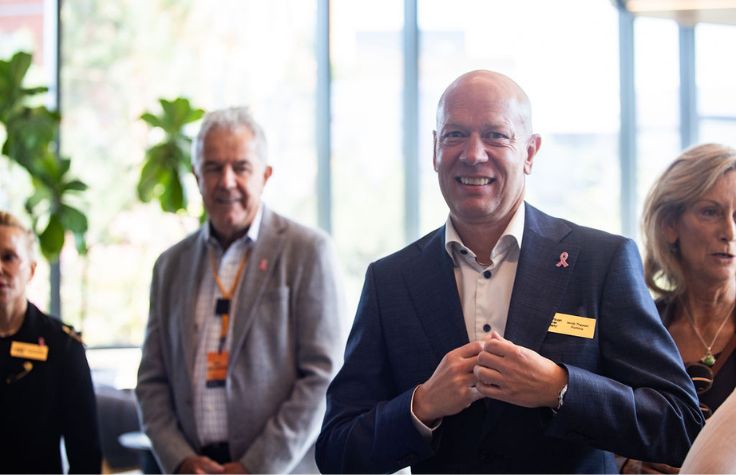This request seems a bit unusual, so we need to confirm that you’re human. Please press and hold the button until it turns completely green. Thank you for your cooperation!
Blog
-
Just a moment…
Just a moment… -
Just a moment…
Just a moment… This request seems a bit unusual, so we need to confirm that you’re human. Please press and hold the button until it turns completely green. Thank you for your cooperation!
Continue Reading
-

Early Introduction of Peanuts Led to Significant Decline in Allergies
Share on Pinterest Rates of peanut and food allergies in young children have dropped significantly following changes to early introduction guidelines. Lindsey Rivera/Stocksy United - Peanuts are one of the most common causes of potentially lethal…
Continue Reading
-

Wedding costs place unexpected financial strain on guests nationwide
Weddings are meant to be celebrations of love. They may also require invited guests to make a financial commitment that brings them stress.
Whether it’s paying for hotels and flights to attend a destination wedding or different outfits and…
Continue Reading
-

Uniting oncology leaders to advance genomic access
The GOAL Summit gathered a select and powerful group of attendees. | Photo: Kristy Walker
October 23, 2025
“Genomics is reshaping how we understand cancer, how we diagnose it, how we treat it, and how we monitor it,” Illumina Global Patient Advocacy Lead Shirlene Badger said during her opening remarks at the first Genomics in Oncology Leaders’ (GOAL) Summit. The event was hosted by Illumina earlier this month at its San Diego headquarters. Badger continued, “But while the benefits of genomics in cancer are clear, uptake remains uneven. As patient advocates, we know better than anyone the consequences: that this means our friends, our family—they are dying.”
The three-day event, based on a similar initiative Illumina led in Europe (the Genomics in Oncology Patient Expert Network, or GOPEN), convened a select group of patient leaders from across the United States to explore the transformative role of genomics in cancer care. Participants represented a variety of tumor types and stakeholder groups—including the Rare Cancer Research Foundation, Go2 for Lung Cancer, Blood Cancer United, and SHARE Cancer Support—and brought varying levels of familiarity with genomics.
During the summit, attendees learned about the latest advancements in genomic technologies, discussed challenges and opportunities for patient access, and shared best practices and lessons learned from their own work. A major theme of the summit was exploring how participants—and Illumina—could work together more closely to advance awareness and increase access to genomics.
Organized by Illumina’s patient advocacy team, the GOAL Summit agenda featured over a dozen sessions focused on the use of genomics throughout the cancer journey, such as genetic testing for inherited cancer risk, biomarker testing, minimal residual disease (MRD) testing (which can monitor disease progression and risk of recurrence), and more. In addition, participants collaborated on topics spanning foundational science, clinical applications, the policy landscape, and patient-advocacy-driven interventions.
Illumina Patient Advocacy Specialist Cody Barnett explains: “We intended for the GOAL Summit to provide a forum where we could not only break down what is meant by genomics in oncology, but also one where we could spotlight the many ways that patient advocates have been instrumental in expanding access to things like biomarker testing. Patient advocacy groups have designed programs and campaigns aimed at raising awareness of precision medicine with patients, families, and medical providers, and in other cases, have launched studies that have helped to prove the clinical utility in their cancer type.”

Nefa-Tari Moore of SHARE Cancer Support tells her story in the session, “Patient Advocacy Efforts to Expand Access to Genomics.” | Photo: Kristy Walker Breaking barriers to genomic testing
In addition to highlighting the clinical role of genomics, the summit also explored the state of patient access, and the obstacles that too often get in the way. Emily Dalton, associate director of medical affairs for oncology, shared the striking statistic that 64% of patients with advanced non-small-cell lung cancer (NSCLC) were not benefiting from precision oncology, despite proven clinical benefits, including more prolonged overall survival. “This is due to a variety of operational and clinical factors,” Dalton said, “including limited tissue specimens, appropriate biomarker testing not being ordered, and challenges with interpreting biomarker test reports resulting in patients not being put on the appropriate targeted therapy.”Patient stories were at the heart of the discussions. Leaders from patient advocacy groups shared firsthand accounts of navigating cancer care and the impact of genomic testing in transforming their cancer journey.
Nefa-Tari Moore, director of Black women’s outreach at SHARE Cancer Support, shared her journey with uterine and ovarian cancer and her experience of not being offered genetic testing until after she had relapsed. “My doctor was shocked I wasn’t offered it the first time, but I was just dismissed, even after asking to have genetic testing,” she said. “Maybe it’s because I’m a Black woman, a Muslim woman, or maybe because I was young. My advice to other patients is to know your rights and advocate for yourself.”
What is the future of expanded use of genomics in oncology?
Eric Duncavage, director of the Division of Genomic and Molecular Pathology at Washington University School of Medicine in St. Louis, discussed his research examining the use of whole-genome sequencing (WGS) for acute myeloid leukemia. In his landmark publication in the New England Journal of Medicine, he determined that WGS identified new findings in 25% of cases compared to standard-of-care testing. Further, he determined that WGS had a lower failure rate, was simpler to run in the lab, generated data that is more easily compared across labs, and is more adaptable as we continue to learn more about what drives cancer.“Precision medicine requires precision diagnostics,” Duncavage said. “Of the 75 novel oncology drugs approved over the past five years, 46 were ‘precision oncology therapies’ that required knowledge of gene mutation status.”

Illumina CEO Jacob Thaysen made a special announcement on the third day. | Photo: Kristy Walker Empowering patient advocates with the Genomics in Oncology Catalyst Fund
The momentum doesn’t stop with the conclusion of the summit. The Illumina Corporate Foundation has committed up to $100,000 in grants to US-based patient advocacy organizations. These grants will support initiatives that address barriers to genomic testing, raise awareness for its role in cancer care, and empower patients and families to use genomic information in shared decision-making with their health care providers.“Patient advocates are a disruptive force for good—challenging norms, reshaping policy, and ensuring the patient’s voice drives progress,” said Illumina CEO Jacob Thaysen. “I’m proud to support you in these efforts.”
Participation in the summit is not required to apply for these grants. Learn more about the Genomics in Oncology Catalyst Fund, how to apply, and eligibility at this link.
Continue Reading
-
Just a moment…
Just a moment… This request seems a bit unusual, so we need to confirm that you’re human. Please press and hold the button until it turns completely green. Thank you for your cooperation!
Continue Reading
-
Arbuthnot lending declines on uncertainty but wealth management strong
(Alliance News) – Arbuthnot Banking Group PLC on Thursday reported a decline in customer loans and leased assets at the end of the third quarter, with budget uncertainty weighing on sentiment.
The London-based merchant bank reported GBP2.3 billion in customer loans and lease assets at September 30, down 9% from GBP2.5 billion a year earlier.
Lending fell by 12% on-year to GBP1.4 billion, and was down 3% from the second quarter.
Arbuthnot emphasised the importance of residential investment and private equity for its business, with both markets hit by lower confidence among businesses and households. The bank attributed the uncertain mood to “speculation around the autumn budget where various tax increases are being suggested”.
“The uncertain economic outlook has meant that lending markets have continued to observe thin volumes of business with lenders aggressively competing for transactions by offering low rates,” Arbuthnot added, but maintained it “has not been drawn into this competition.”
Still, the bank reported 24% annual growth in funds under management and administration, which amounted to GBP2.5 billion at the end of September, compared to GBP2.0 billion a year prior. This was “driven by strong inflows year to date and investment portfolio performance following the market turbulence at the beginning of the year,” Arbuthnot said. FUMA grew 5% on-quarter.
In addition, customer deposit balances rose 17% on-year to GBP4.4 billion from GBP3.8 billion, but remained flat on a quarterly basis.
Looking ahead, Arbuthnot expects “continuing macro-economic uncertainty,” and plans to “focus on continuing to support existing clients, whilst maintaining its principle of high quality credit lending for new business.”
Arbuthnot Banking shares traded 0.4% higher at 901.00 pence on Thursday afternoon in London.
By Holly Munks, Alliance News reporter
Comments and questions to newsroom@alliancenews.com
Copyright 2025 Alliance News Ltd. All Rights Reserved.
Continue Reading
-

How ‘Nobody Wants This’ Got Selena Gomez, Chris Stapleton for Season 2
Nobody Wants This returns to the screen on Thursday on Netflix as one of the most anticipated shows of the year, and now it’s got an original soundtrack that matches those ambitions.
A cross-genre mishmash that includes pop from the…
Continue Reading
-

Ipsen Acquires ImCheck Therapeutics: A&O Shearman Advises Deal
This acquisition is focused on the clinical-stage program ICT01 in acute myeloid leukemia (AML) targeting patients who are ineligible for intensive chemotherapy or targeted treatments. ICT01 is a first-in-class monoclonal antibody whose data from an ongoing trial showed a high treatment response, which could make it a new standard of care for acute myeloid leukemia, an aggressive blood cancer affecting older adults.
The transaction is expected to close by the end of Q1 2026, subject to fulfilment of customary closing conditions, including the required regulatory and governmental approvals under French and U.S. regulations.
Marc Castagnède, partner at A&O Shearman, said: “This transaction clearly demonstrates our ability to support clients in executing complex, strategic deals in highly specialized sectors such as life sciences. We are proud to have advised Ipsen on this landmark acquisition, which sits at the heart of biotech innovation and therapeutic advancement.”
The A&O Shearman team is being led by M&A partner Marc Castagnède with support from M&A senior associate Antoine Messent, and associate Fatima Ahamada.
Other members of the Paris team involved in the transaction include partner Olivier Picquerey and senior associate Antoine Tantaro on employment matters; partners Laëtitia Bénard and Charles Tuffreau, associate Manon Perret and consultant Marianne Delassaussé on IP matters; senior associate Clémence d’Almeida on antitrust matters; counsel Luc Lamblin and associate Charles-Hugo Lerebour on regulatory and FDI matters; partner Laurie-Anne Ancenys and associate Thomas Feigean on IT and data aspects; and partner Charles del Valle on tax matters.
Support was also provided by the A&O Shearman US corporate and antitrust teams.
Continue Reading
-

1886 Evolves Into Urban Luxury at Riyadh Fashion Week Fall 2025
Nicolas Ottersten, creative director of Saudi’s popular streetwear label 1886, presented a collection that crystallized the brand’s evolution from its street roots into what he’s dubbed “urban luxury.” It’s a synthesis of…
Continue Reading